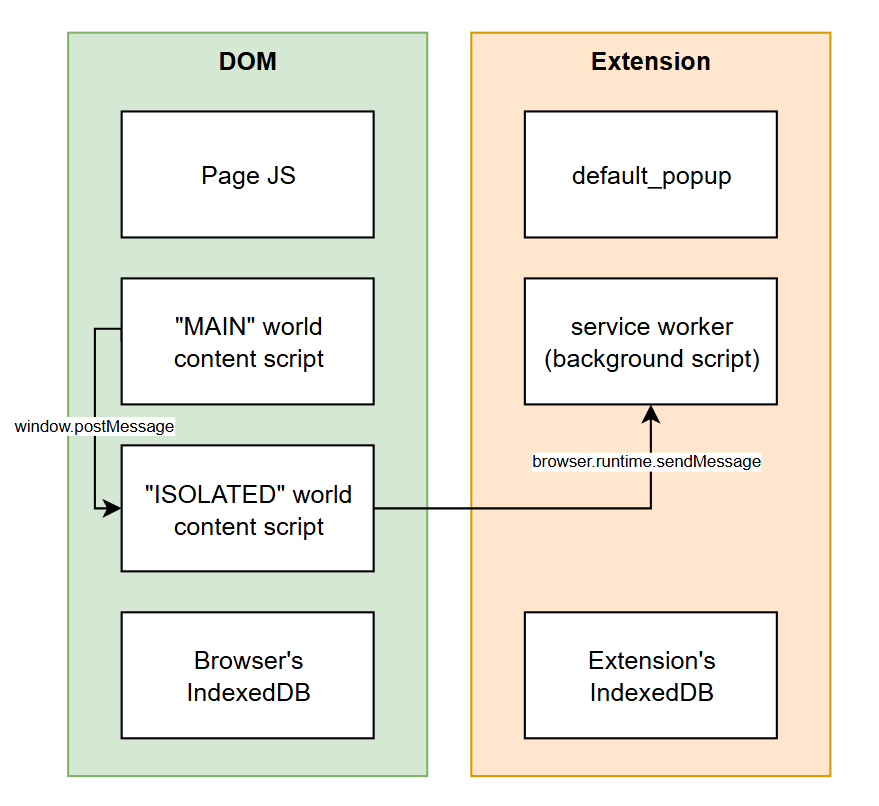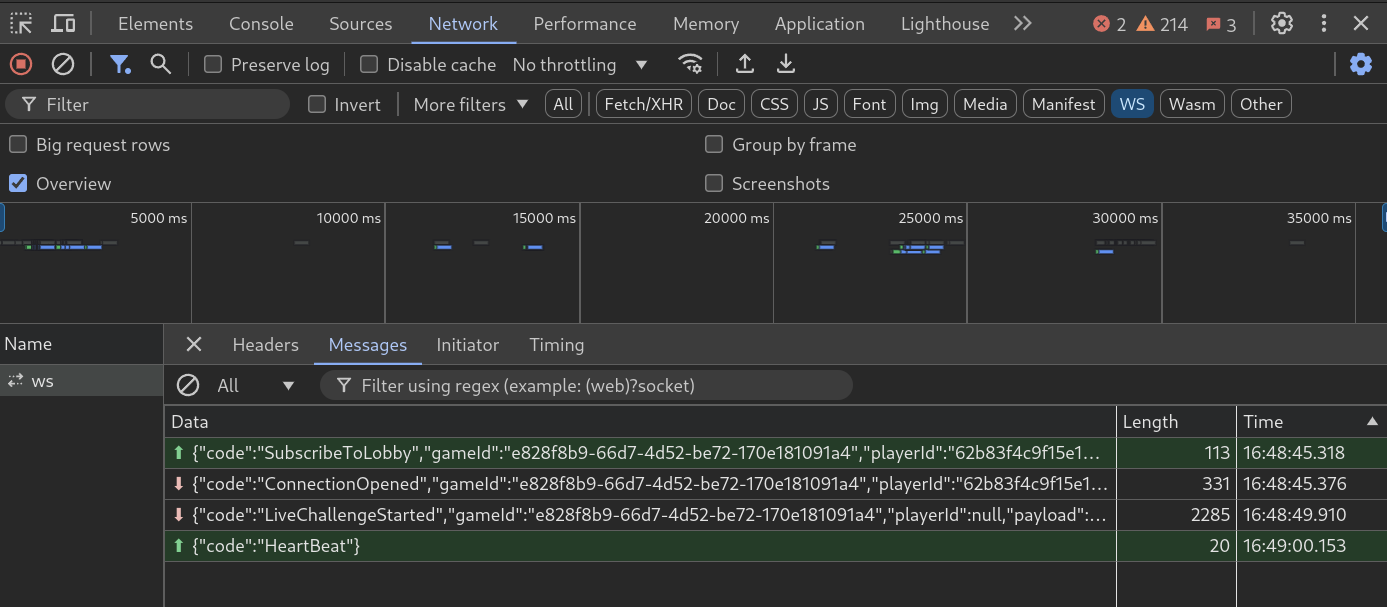Intercepting Websocket Messages To Analyze Geoguessr Party Games
My friends and I play GeoGuessr every Wednesday. It’s a small yet awesome tradition of ours, a reason to get together on Discord every week. Over time, we started asking questions. What is our top score? How often do we confuse UK with New Zealand? Does that guy ever gets Kenya right? Do we ever get Ukraine wrong? Unfortunately, GeoGuessr provides neither such stats, nor any kind of records of our games. So I had to collect this data myself.
Since I already had some experience intercepting requests with browser extensions, I figured this was the way to go. There was only one catch - GeoGuessr uses WebSockets to synchronize game state between players. But it shouldn’t be much harder to intercept WebSocket messages rather than HTTP requests, right?
Browser APIs
If you look at the “webRequest” section of JavaScript APIs for WebExtensions docs, you’ll see the following statement:
“webRequest” - Add event listeners for the various stages of making an HTTP request, which includes websocket requests on
ws://andwss://.
But, WebSocket requests != WebSocket messages. When the browser wants to open a WebSocket connection, it has to communicate this desire to server somehow. It is done by sending HTTP 101 Switching Protocols request to the same endpoint that would later be used to send WebSocket messages. So that is the request they’re referring to. webRequest API just doesn’t cover WebSocket messages.
Okay, so maybe there is another API specifically for WebSockets? Well, yes, there is! Both Chrome and Firefox implement “The WebSocket API”, but it is nothing like the webRequest one. There are no events you can listen to, no way to list existing connections, no way to interact with any existing connection. It’s meant for creating new connections, not intercepting messages on existing ones.
Hacky way
There are a couple of ways to approach this. First one is to monkey-patch “WebSocket” object in your browser, so that you can execute any custom code before proceeding with an event.
It looks like this:
WebSocket.prototype.oldSend = WebSocket.prototype.send;
WebSocket.prototype.send = function (data) {
console.log("ws: sending data", data);
WebSocket.prototype.oldSend.apply(this, [data]);
};
var oldAddEventListener = WebSocket.prototype.addEventListener;
WebSocket.prototype.addEventListener = function (eventName, callback) {
return oldAddEventListener.apply(this, [eventName,
(e) => {
if (e.type == "message")
console.log("ws: receiving data", e.data);
callback(e)
}
])
};
I made a gist with full working example. It’s pretty concise and, surprisingly, it works in both Chrome and Firefox! However, there are a couple of caveats:
- monkey-patching WebSocket object might break functionality that relies on it, so it has to be done with caution
- it’s executed in content script, while you might want to access some features available only in service workers (background scripts); in this case, send a message to service worker with browser.runtime.sendMessage
- it must be executed in the “MAIN” world, while you might want to communicate with other parts of your extension; in this case, send a message with window.postMessage
To make it work in my case, I had to send messages to “ISOLATED” world first, then send them to service worker.
Let’s talk “worlds”
There are two types of content scripts: ones that live in the “MAIN” world, and ones that live in the “ISOLATED” world. It was crucial for my extension, because when I monkey-patched “WebSocket” object the first time, it was not the same “WebSocket” object that is being used by GeoGuessr page JS code. So it made no difference. Only when I made a separate content script that lives in “MAIN” world, I finally managed to modify proper “WebSocket” object.
But with great power comes great responsibility. I lost my ability to communicate with background scripts. I thought that was it, finita la commedia. Thankfully, I was wrong once again. It turns out, content scripts in “ISOLATED” world are not that isolated. They share the same “window” object (DOM) with scripts in “MAIN” world. Thanks to “window.postMessage” method, those scripts can communicate!
This reminded me how background scripts themselves are separated from content scripts. They live in their own “background page” context, basically on another “tab”. For example, when you save data to IndexedDB with content script (regardless of “world” it lives in), data is saved into “page” IndexedDB. And when you save data in background script, it is saved into “extension” IndexedDB. Thankfully, content scripts can communicate with background scripts as well, via “browser.runtime.sendMessage”!
It was a bit hard for me to wrap my head around this, so I made a simple visualization.

Even hackier way
There is another, although unconventional, option. Chrome implements debugger API, which lets you attach a debugger to a tab (or tabs), listen to debugger events there, and send Chrome DevTools Protocol (CDP) commands. It’s a very powerful API. A lot of things that are possible to do in DevTools are also possible to do with this API. Of course, certain features were not exposed due to security reasons. But it’s still more than powerful enough for our use case.
Since we can see WebSocket messages in Chrome DevTools, chances are we can intercept them on a debugger level.

All we need to do is attach debugger to our tab, listen to all events, and react once webSocketFrameReceived event is fired.
// background.js
// attach debugger when page is loaded
chrome.tabs.onUpdated.addListener(function (tabId, changeInfo, tab) {
if (changeInfo.status === 'complete' && tab.url && tab.url.startsWith('http')) {
attachDebuggerAndEnableNetwork(tabId);
}
});
// listen to debugger events, react when we receive WebSocket message
chrome.debugger.onEvent.addListener(function (source, method, params) {
if (method == "Network.webSocketFrameReceived") {
data = JSON.parse(params["response"]["payloadData"]);
console.log("ws: receiving data", data);
}
});
There are a couple of issues with this solution:
- it’s impossible to make it work in Firefox, as it has no such API
- it requires powerful “debugger” permission
- whenever the extension is run, an ugly “{extension_name} has started debugging this browser” bar appears on top of the page So, unless I’m missing something, the first method should be better for all practical purposes.
GeoGuessr Stats
If you’re interested in trying out this extension yourself, it is available in both Chrome and Firefox.
In extension tab you can only see top scores and filter for games on a particular map or with particular restrictions. However, the whole point of this endeavor was to get some deeper insights. So I exported data into JSON to analyze it later.
Guess entry looks like this:
{
"roundNumber": 4,
"lat": 23.48790806385134,
"lng": 120.65365041800166,
"distance": 111899.3277221051,
"time": 40,
"score": 4639,
"wasCorrect": false,
"gameId": "43b82fcf-29d8-4daf-84e9-80e029301229",
"playerName": "Demaga Chill"
}
So the main obstacle would be reverse geocoding lat/lng pairs into country names. GeoPandas is great for this kind of job, but I’ve been playing around with Polars lately and really wanted to use it here. GeoPolars does exist, but the project is on hold, and frankly, it would be an overkill for me anyway.
There is a small Polars plugin “polars-reverse-geocode” that serves this exact purpose. It is fast, accurate, and requires no additional dependencies (it is based on Rust’s reverse_geocoder, which is a part of standard library). So I used this plugin to reverse geocode coordinates for both guesses and answers. After that, I could finally get to analyzing this data.
Countries we rarely get right:
| country_code_answer | total | guessed | not_guessed | ratio |
|---|---|---|---|---|
| “AR” | 78 | 13 | 65 | 0.166667 |
| “FI” | 65 | 12 | 53 | 0.184615 |
| “ZA” | 64 | 10 | 54 | 0.15625 |
| “BE” | 61 | 10 | 51 | 0.163934 |
| “CL” | 59 | 7 | 52 | 0.118644 |
Probably the most surprising thing here is how often we get spawned in Argentina! Unfortunately, we rarely get it right. I am also quite shocked with how rarely we get Belgium right! Come on guys, it should’ve been easy.
Countries we often get right:
| country_code_answer | total | guessed | not_guessed | ratio |
|---|---|---|---|---|
| “KR” | 30 | 26 | 4 | 0.866667 |
| “UA” | 35 | 28 | 7 | 0.8 |
| “GR” | 30 | 23 | 7 | 0.766667 |
| “NL” | 62 | 43 | 19 | 0.693548 |
| “JP” | 42 | 27 | 15 | 0.642857 |
We guess Korea better than we guess our home country, wow! I guess it makes sense, as Korea is highly urbanized, and Korean language is easily recognizable. Same point for language goes to Greece.
Most common confusions:
| guess_answer | count |
|---|---|
| “CA_US” | 34 |
| “AT_DE” | 31 |
| “GB_IE” | 23 |
| “SZ_ZA” | 20 |
| “ID_MY” | 19 |
| “AU_US” | 16 |
| “EE_FI” | 16 |
| “EE_LT” | 16 |
| “AU_NZ” | 16 |
| “AU_ZA” | 15 |
This is not surprising at all. If you get spawned in a location without many clues, it will be hard to distinguish Canada from US, or Austria from Germany, or Estonia from Finland.
Worst-yielding countries:
| country_code_answer | total | guessed | not_guessed | avg_score | ratio |
|---|---|---|---|---|---|
| “AU” | 110 | 45 | 65 | 1264.8 | 0.409091 |
| “CA” | 71 | 30 | 41 | 1727.267606 | 0.422535 |
| “NZ” | 43 | 20 | 23 | 1744.860465 | 0.465116 |
| “US” | 88 | 55 | 33 | 1866.306818 | 0.625 |
| “IN” | 28 | 18 | 10 | 2396.892857 | 0.642857 |
In the game, what matters most is not guessing the country, but guessing as close to the actual location as possible. That makes bigger countries quite harder to gain score at. Even though we guess US and India often enough, average score is less than 2500. For comparison, average score in Korea is 4054, and maximum score possible is 5000.
Of course, many more interesting insights can be extracted with some thought.
You can use these Jupyter Notebooks as a starting point for analyzing your games too.
Conclusions
- Intercepting WebSocket messages in browser is not as easy as I thought, but absolutely achievable.
- Reverse geocoding in Polars is unexpectedly fast and accurate.
- My friends and I are really good at guessing Korea in GeoGuessr.
Links
- (Gist) monkey-patch method
- (Gist) Chrome DevTools method
- GeoGuessr Stats for Chrome
- GeoGuessr Stats for Firefox
- GeoGuessr Stats source code
- Jupyter Notebooks for analyzing games data